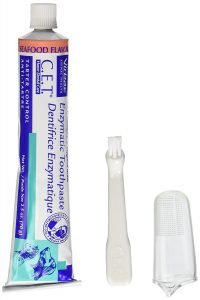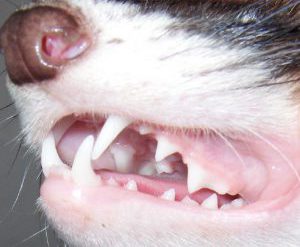Although it may seem like a difficult process, with the right tools brushing your ferret’s teeth can be doable. Most Veterinarians recommend that you brush your ferret’s teeth twice a month (at least) to keep your ferret’s teeth healthy. This guide will show you how.
Why Should You Brush Your Ferret’s Teeth?
Dental disease. More and more it has been determined, that like people, pets need dental care to prevent dental disease and to keep them healthy overall. Brushing a dog’s teeth has been recommended by Vets for a long time. As this has become common practice, Vets have been recommending dental care for other pets as well–including ferrets.
Dental disease in ferrets, as well as in other pets and in people, starts with gingivitis. Gingivitis is an inflammation of the gums. This inflammation is caused by bacteria that live in the mouth and invade the pockets surrounding the teeth. Untreated, gingivitis can progress to periodontitis, a disease involving the teeth and gum pockets. Eventually, these oral bacteria also invade the bloodstream and can cause infections in the kidneys and even the heart valves. The severity of gingivitis is partly determined by the strength of the ferret’s immune system. It occurs in middle-aged to older ferrets. Periodontal disease, luckily, is uncommon in ferrets.
Causes of Gingivitis and Periodontal Disease in Ferrets
Plaque accumulation is one of the main causes of gingivitis and periodontal disease in ferrets. If you haven’t been brushing your ferret’s teeth, plaque and tartar are sure to build up.
Predisposing factors include:
- Old age
- Crowded teeth
- Diet mainly consisting of soft food
- Open-mouth breathing
- Bad chewing habits
- Lack of oral health care
- Uremia
- Diabetes
- Autoimmune diseases
The good news in regard to gingivitis is that it’s usually reversible.
Treatment of Gingivitis and Periodontal Disease in Ferrets
When dental disease progresses to the point of severe tartar accumulation, then brushing your ferret’s teeth will not be enough. Your Vet will need to clean your ferret’s teeth. Cleaning your ferret’s teeth is done the same way as a dog’s or cat’s teeth are cleaned. The tartar is removed mechanically from the teeth with a dental scaler and the surfaces of the teeth are then polished to slow down plaque accumulation. Obviously, ferrets must be anesthetized for this process. Most cleanings take about 20 to 30 minutes for ferrets.
A little prevention can save your ferret the stress and potential danger of being anesthetized and you can save yourself the cost of the procedure as well as the stress.

I must confess that, throughout all the years of having ferrets in my family, only recently have I realized the importance of regular dental care. A fellow ferret parent I know almost lost her ferret due to accumulated dental problems. Her ferret was not eating as much as usual and she became concerned. She took him to the Vet and was told that her ferret had several infected teeth that would need to be removed and he would then need to take antibiotics to treat the infection. He was an older ferret and had some other health problems, making putting him under anesthesia even more of a risk. After the procedure, he didn’t start waking up as he should have. It started to look like he may not wake up at all. Thankfully, he eventually did, but it was quite a scare and a wake-up call.
I know brushing your ferret’s teeth is easier said than done. Ferrets have small mouths with small teeth. Plus, ferrets dislike having their mouths handled. However, there are a few tools that can make brushing your ferret’s teeth doable.
There are small pet toothbrushes and small finger brushes that fit on the tip of your fingers made for cats which can also work for ferrets. There are flavored pet toothpastes, such as CET Pet Toothpaste, that comes in malt flavor–a favorite of many ferrets. There are tooth sprays and gels, such as Oral Care Gel. But first, you have to get your ferret used to having her mouth handled! Since ferrets won’t naturally allow you to put your fingers or a toothbrush in their mouths, you will have to ease your ferret into the tooth brushing process.
Brushing Your Ferret’s Teeth Step 1
Preparing Your Ferret
You can’t expect your ferret to open her mouth and allow you to do what you want in it. You need to get her used to you playing around her mouth in a non-stressful way.
You will find it much easier if you scruff your ferret and rest her body down the inside of your forearm. She will be supported by your arm and unable to move around.

Start by rubbing your ferret’s cheeks and mouth for about 10-20 seconds several times a day for a few days. Once your ferret becomes more familiar with this interaction you may begin to rub her teeth and gums to get her used to your fingers in her mouth and to get her ready for the brushing. As she becomes more familiar with this stage, allow her to taste the toothpaste you plan to use. Be sure to only use pet toothpaste–NEVER USE TOOTHPASTE FOR HUMANS! It can make your ferret very sick. Eventually, you should be able to incorporate the toothbrush with the toothpaste and begin to brush your ferret’s teeth.
Brushing Your Ferret’s Teeth Step 2
Examining Your Ferret’s Mouth
In the early phases of gingivitis, plaque and tartar are present and there is a mild redness of the gums. Other common signs of gingivitis and periodontal disease include:
- Bad breath
- A thin red line along the margins of the gum and teeth
- Gums may bleed easily on contact
- Fractured canine teeth
The gums are a good indicator of your ferret’s overall health. Healthy gums are pink, smooth and moist. If they look white, bluish or grayish, contact your Vet as soon as possible, as this can be a sign that your ferret may be suffering from one of several diseases. If the gums are very red, it may be a sign of dental disease. Also, look to see if she has any broken or chipped teeth. Chipped and broken teeth are quite common in ferrets. It is usually the upper fangs that get broken. Many ferrets have a habit of grasping cage bars or doors in their mouths and pulling back forcefully. If your ferret does have a chipped or broken tooth, you should make an appointment with your veterinarian to see if the root of the tooth has been exposed. Sometimes, teeth simply wear down to the roots from aggressive chewing.
Brushing Your Ferret’s Teeth Step 3
Brushing Your Ferret’s Teeth
I recommend using a small cat toothbrush as opposed to a finger toothbrush. The finger brushes are too big for a ferret’s mouth, in my experience. Make sure to be gentle on your ferret’s teeth and gums when brushing. When brushing your ferret’s teeth, gently brush the gums as well–especially at the gum line. Concentrate on the back teeth and the outside of the teeth and then work on the front teeth and the inside of the teeth. Depending on your ferret’s tolerance, you may be unable to get to the inside of the teeth. Keep your brushing sessions short, no more than 10 seconds until she is used to it. No more than 30 seconds after that. It’s better to brush your ferret’s teeth for shorter periods, but more frequently, than trying to brush them thoroughly in one long session–making it more stressful for your ferret.
After you have been brushing your ferret’s teeth regularly and have removed much of the plaque. You may want to supplement the brushing with an oral gel or solution. I would not recommend using one of these products unless your ferret’s teeth are relatively clean and free of tartar. Keep in mind that these products also need to be applied to your ferret’s teeth, similar to brushing.
After getting your ferret used to having her teeth brushed, spending a few minutes twice a month on your ferret’s dental health goes a long way in keeping your ferret healthy.
You can find a great selection of pet dental products, HERE.
Looking for other guides to help with your ferret’s hygiene needs? Check out How To Trim Ferret’s Nails—A Step By Step Guide, How to Bathe a Ferret–Important Steps and How to Manage Shedding in Ferrets.



Wow, I’ve never owned a ferret but this article was super helpful – I have a cat and a dog and I think parts of this could definitely pertain to them. I learned that human toothepaste is harmful to dogs! When I read what you said about ferrets… I Googled dogs…. so, that’s good to know! I also never thought of “easing” them into it by playing with their mouths. Great ideas, and I love the step by step approach you took in explaining this process! Thanks so much!
Hi Courtney
Thanks for your comment. I’m glad you found this tooth brushing guide applicable to other pets. Cats, like ferrets can take some time to get used to the process too.
This is some fascinating stuff. I am glad it’s you brushing a ferret’s teeth. I know they have to be wonderful pets, and it’s a great idea to do everything you can to keep them healthy. That first picture is so flippin’ cute.
My uncle had a skunk once, “de-fumed” of course. Are they similar to ferrets?
Thanks for you comment and question, Alan.
Ferrets and skunks come from the same family, but they are quite different.Ferrets are domestic pets, whereas skunks are wild animals–even if tame. If you want to lean more about ferrets, see Ferret Facts, or check out some of my other articles.
Good to know that brushing your ferret’s teeth even twice a month can make a difference. They can be pretty squirmy patients!
Yes, ferrets can be very squirmy!
It sounds like diagnosing a ferret is a little like diagnosing a human: you look at his mouth and gums to detect other things wrong in his body. You mention that the difficulties star at middle age. What is the life span of a ferret?
Desensitizing him to the toothbrush sounds dangerous. Have you ever been bit?
Hi Judy,
Healthy teeth are important for overall health in ferrets, as in people and other pets. I haven’t been really bitten, since I teach my ferrets not to bite, but I have been nibbled on a bit!Ferrets generally live 5-9 years in the U.S. If you would like to find out more, check out How Long Do Ferrets Live.
I love ferrets. I’ve also found them to be unique among animals and very curious. I never knew about dental disease in them or that you can actually brush their teeth. I found this article to be very thorough and informative about dental disease in ferrets and how to care for their teeth. Isn’t hard to brush their teeth even after getting them used to it? Have you ever been bitten during the process? I know my dogs are never happy about teeth brushing and it takes me and my husband to brush their teeth lol. Take care.
Hi Deborah
I’m glad you liked the article. Brushing an animal’s teeth is never easy. The advantage of brushing a ferret’s teeth is that since ferrets are so small, you can hang onto them easier.It can take a while for a ferret to get used to having his teeth brushed, and they are never happy about it, but keeping them healthy is worth it. I have never been bitten. I have taught my ferrets not to bite.
It is crazy how common it has become in just the past 5 years for veterinarians to recommend brushing teeth in housepets! It is extremely common in cats and dogs as well. They say that one of the biggest reasons humans died so young 100 years ago is because their mouths were so unclean and that led to other larger and more dangerous diseases running rampant in a lot of cases. I’m all for this, thanks so much for the comprehensive guide!
Thanks for your comment, Craig.
I’m happy you liked the article. Yes, poor dental hygiene can lead to many health problems in pets and people. Heart disease is one serious result.
Great information! I don’t think I would’ve ever thought of brushing a ferrets teeth. My boyfriend and I had a ferret in college and I don’t ever remember brushing its teeth, but I imagine you should. Especially since we would brush a dogs or cats teeth. Thanks again!
Thanks for stopping by, Tiffany! I’m glad you liked the article.
I’m glad I came across your article on how to brush your ferret’s teeth. I was looking for this step-by-step little guide. It’s full of little details I never knew I should check.
Thank you for all these useful info and for sharing!
Thanks for your comment. I am always happy to help!
We have two ferrets that we got from a rescue. One of them is apparently quite a bit older. He started having fits where he would start foaming at the mouth and scratching the roof of his mouth. I just took him to the vet today. It turns out he has a bad tooth! He was given antibiotics and hoping that will clear it up. I did not realize the importance of brushing their teeth till now. Your article has been very helpful and I will find a brush and toothpaste asap!
Hi Becca,
I hope your ferret is feeling better! Good luck and thanks for your comment!